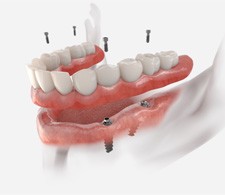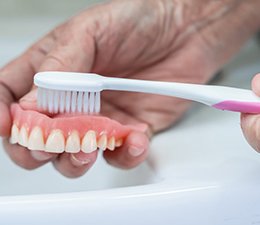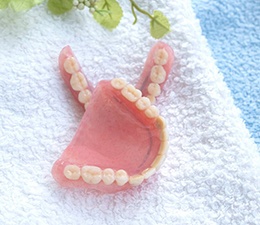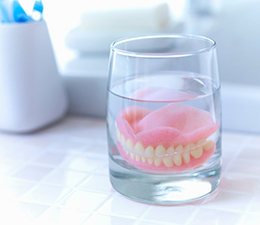Dentures – Waterbury, CT
Enjoy Life Without Tooth Loss

Although your teeth are designed to last for a lifetime, this is not the case for 120 million adults in the United States. Disease, trauma, decay, and other factors can cause tooth loss, and since each tooth plays an important role in your oral health and quality of life, you need an effective way to restore your smile. Many turn to Waterbury Smiles for dentures that allow them to enjoy a complete grin. Here’s a brief guide to how we can help, but don’t be afraid to contact us with any questions or to schedule a consultation.
Why Choose Waterbury Smiles For Dentures?
- Experienced Dentist
- Lifelike and Beautiful Restorations
- Financing Options Available
Who Is a Good Candidate for Dentures?

The loss of even a single tooth can significantly impact your confidence and quality of life. Missing teeth can make it difficult to eat many foods, leading to nutritional deficiencies over time while also making it more difficult to speak clearly.
Your oral health will also become compromised. The loss of a tooth can allow the neighboring teeth to shift out of place, causing alignment issues that increase your risk for tooth decay and gum disease by making oral hygiene more difficult. Tooth loss can also lead to dental injuries by unevenly redistributing the chewing pressure among the remaining teeth.
It’s important to have healthy gums before receiving dentures, so any gum disease will have to be treated and resolved before you can be fitted for your appliance. In many cases, individuals who are not missing all of the teeth in an arch may be better suited by a restorative treatment other than dentures.
Types of Dentures

There are several types of dentures, and the one that is right for you depends on factors such as your preferences and the number of remaining teeth. After your consultation, our doctor may recommend:
Partial Dentures

Partial dentures are custom-made prosthetic crowns attached to a gum-colored base that replace one or more missing teeth. A partial denture will feature a series of metal clips that hold it in place by connecting to the remaining natural teeth.
Full Dentures

Full dentures are used when all the teeth are missing on one arch. These customized appliances include a full set of prosthetic teeth held in a gum-colored acrylic base. These dentures are secured in the mouth using denture adhesive, the mouth’s natural suction, or a combination of both.
Implant Dentures

Implant dentures allow for a more permanent solution with a superior hold. The prosthetic teeth are anchored in place using dental implant posts that are surgically placed into the jawbone. These dentures look more natural, last longer, and create superior chewing force that allows the patient to enjoy the wide variety of foods needed for a healthy diet.
The Benefits of Dentures

When you are missing multiple or all your teeth, once-basic tasks like eating, speaking, or grinning confidently become much more challenging. Dentures are a proven solution that can restore your smile’s appearance and functionality to improve your daily quality of life. Whether you need a full or partial set, these restorations offer many advantages that help you look and feel like the best version of yourself.
Continue reading to learn more about how you could benefit from dentures, and feel free to contact us for additional information.
Psychological Benefits

You likely didn’t choose to lose your teeth, and it can be difficult to accept the sudden changes to your reflection and abilities. You might feel embarrassed or self-conscious and start to worry so much about how others might judge you that you avoid spending time with them. Unfortunately, missing out on social activities or valued time with loved ones combined with poor self-esteem can result in anxiety or depression.
Our team can boost your mental and emotional well-being by rebuilding your smile so you feel more confident and at-ease.
Clearer Enunciation

Your teeth are essential in your ability to speak because you must press your tongue against them in specific ways to produce a variety of sounds. Gaps in your grin can lead to changes in your speech patterns, like a lisp.
Thankfully, with dentures in place, you once again have a full set of teeth to enunciate words to communicate more clearly. It can take about a month for your tongue and other supporting muscles in your mouth to adjust to speaking around your prosthetics, but you can ease this transition by practicing speaking slowly or reading out loud at home when you’re alone.
Improves Nutrition

Did you know that patients missing teeth are more vulnerable to gastrointestinal problems or becoming malnourished? Your chompers are responsible for grinding food sufficiently enough to be easily swallowed and digested. If you’re missing some, you might end up consuming overly large pieces that clog up your system or stick to softer, less nutritious foods that are easier to eat.
Your new teeth restore your chewing power so you can enjoy a wider variety of wholesome ingredients to support your oral and overall well-being.
Preserves Oral Health

Any remaining teeth in your mouth are likely to shift out of alignment to fill in the gaps left behind by ones that were lost. This can wear down your enamel unevenly or prematurely, increasing your vulnerability to tooth decay or gum disease.
When you wear your dentures, they ensure that everything remains in its right place to prevent potential problems.
Expands Opportunities

It’s natural to want to make a positive first impression when you have an upcoming job interview, reunion, first date, or other momentous occasion. However, the quality of your smile is one of the first things that other people notice about you, and if you’re missing teeth, you might be remembered for the wrong reasons.
Having a complete set of teeth boosts your confidence so you can enjoy increased opportunities on the job, deeper relationships, and a more satisfying social agenda.
How Dentures Are Made
 Every smile is unique, and so is every set of dentures we create at Waterbury Smiles. These custom-crafted prosthetics replace missing teeth and restore your ability to eat, smile, and speak with the ones you love.
Every smile is unique, and so is every set of dentures we create at Waterbury Smiles. These custom-crafted prosthetics replace missing teeth and restore your ability to eat, smile, and speak with the ones you love.
We partner with local dental labs to design dentures that are comfortable, durable, and natural-looking. Using a blend of leading-edge dental technology and skilled craftsmanship, we ensure your dentures fit perfectly and support your long-term oral health. Read more below to see exactly how these incredible prosthetics are made!
What Are Dentures Made Of?

Dentures are made from durable, lifelike materials designed to look and feel just like natural teeth. Each set has two key parts:
- The Base: Typically made from acrylic or flexible polymer that’s dyed to closely match your natural gum tissue. For partial dentures, the base may also include metal clasps that attach to nearby teeth.
- The Teeth: Usually crafted from porcelain or acrylic resin, both of which offer a natural appearance and longevity. Porcelain teeth are especially durable and can last 10 years or more with proper care.
At Waterbury Smiles, we choose materials that ensure your dentures look great and perform well for years to come.
The Denture Creation Process

Creating dentures in Waterbury is a step-by-step process that combines precision with personalization. From start to finish, it typically lasts from two to three weeks, depending on your situation. Here’s what you can expect:
- Initial Consultation: We begin with a thorough exam to assess your needs and figure out the best denture type for your smile.
- Digital Impressions: We take impressions of your gums and any remaining teeth. These serve as the “blueprint” for your soon-to-be prosthetics.
- Temporary Dentures: We’ll then provide you with some temporary dentures while your permanent set is being made. This way, you’ll never be without a smile!
- Wax Try-In: The dental lab creates a wax version of your dentures for you to try. This allows us to fine-tune the fit, bite, and appearance before finalizing.
- Final Dentures: Once everything looks and feels right, the lab fabricates your final dentures using high-quality materials.
- Final Fitting: You’ll return to our Waterbury dental office for a final fitting and any last adjustments to ensure your dentures are comfortable and secure.
Adjusting to Your New Dentures

Getting used to new dentures can take a little time, but most patients adjust within a few weeks. It’s normal to experience some slight discomfort, speech changes, or eating challenges at first.
However, by practicing your speech, eating soft foods, and giving your mouth time to adapt you’ll speed up the adjustment period significantly. If discomfort gets worse or persists for more than a couple of weeks, give us a call. We’ll check your prosthetics and make any necessary adjustments to ensure your dentures feel just right.
Understanding the Cost of Dentures

Patients often assume that the cost of replacing missing teeth with dentures is out of their budget. In reality, our team at Waterbury Smiles strives to make pursuing a healthy, beautiful, and functional smile affordable. At your consultation, we will create a custom treatment plan, determine the price, and review all of the financial solutions available to you. In the meantime, you can read on to learn more about the price of dentures.
Factors That Affect the Cost of Dentures

In order to provide you with an estimate of the price, we need to determine:
- The number of teeth that need to be replaced
- If any preliminary treatments are needed, like gum disease therapy
- Which materials are ideal for creating your custom denture
- The type of denture that’s best for you (i.e., partial denture, full denture, implant denture)
Of course, we will review each of these factors as well as several others during your consultation at our Waterbury dental office. That way, you are fully a part of the process of rebuilding your smile!
Are Implant Dentures More Expensive?

Typically, implant dentures are more expensive than partial and full dentures upfront. In the long-run, however, there’s a good chance that implant dentures are a better choice for your wallet – they can last for 30+ years with proper care! That’s why we encourage our patients to consider more than just the upfront price when determining which tooth-replacement solution is best for them. As always, we will be here to answer any questions you have so making the decision is stress-free.
Does Dental Insurance Cover Dentures?

Since every dental insurance plan is unique, there isn’t a one-size-fits-all answer when it comes to the cost. With that said, it’s possible that your provider will cover a portion of the cost – whether it’s the consultation, necessary preliminary procedures, or the denture itself. If you aren’t familiar with your benefits or are having a hard time understanding your coverage, you’re more than welcome to ask our team for assistance. We can provide you with an estimate of your out-of-pocket expenses as well as file the claims on your behalf!
Other Options for Making Dentures Affordable

If you don’t have dental insurance currently, then consider CareCredit. A trusted third-party financier, CareCredit offers patients several flexible payment plans. As a result, you don’t have to budget for paying for the entire cost of dentures upfront. Instead, you can break down your payments into smaller chunks that fit into your monthly budget. If you want to learn more about this financial solution before signing up, don’t hesitate to ask us! We can help you find the answers you’re looking for every step of the way.
Dentures Aftercare

After receiving your brand-new dentures, you’ll want to make sure to implement certain practices so that you can make the most of your full smile again. While they might not get cavities, it’s still important that you take great care of them every day. Without proper care, they can end up fitting uncomfortably and can even negatively impact your oral health later on. Keep reading to learn some of the best tips for maintaining your dentures.
Remove After Eating

After eating, take a few moments to remove and gently rinse your dentures. This simple step clears away leftover food and plaque that could lead to gum sensitivity or infection. Always use cool or slightly warm water—hot water may distort your dentures, making them feel awkward or uncomfortable.
Clean Your Prosthetic

To keep your dentures in great condition, make it a habit to clean them daily outside of your mouth. Use a soft toothbrush and either mild dish soap or a denture-specific cleaner. Avoid regular toothpaste, as it’s often too gritty and can scratch the surface. Once brushed, place your dentures in a glass of clean water or a soaking agent overnight to help them retain their shape. Be sure to give them a good rinse before wearing them again.
Keep Your Dentures Safe

While dentures are built to last, they’re still vulnerable to breakage if dropped or mishandled. To prevent damage, clean them over a folded towel or a basin of water to cushion any accidental drops. When not in use, keep them in a safe place—out of reach of curious pets or small children.
Remove Dentures When You Sleep

Removing your dentures before bed gives your gums time to relax and breathe, helping to minimize inflammation and pressure points. Wearing them overnight can hinder circulation in your mouth and may result in some sore areas, and it can even prevent your gum line from receiving essential nutrients to keep it healthy. Store them in a glass of water or a suitable soaking solution to prevent them from becoming brittle or misshapen.
Notice Changes

As you adapt to your dentures, stay alert to any unusual changes. If they begin to feel unstable, irritate your mouth, or cause soreness, reach out to our dental team as soon as possible. Ill-fitting dentures can lead to more serious oral health issues if ignored. And always avoid attempting DIY fixes—improper adjustments can cause lasting harm to both you and your smile.
Denture FAQs
What is the Average Age for Dentures?
There’s no age limit on rebuilding your smile, and people from 0 to 100 can potentially lose their teeth for various reasons. However, tooth loss is more common in senior adults than other populations. It’s believed that about 66% of people who are 40 to 64 years old have lost at least one tooth, compared to only 33% of those who are 20 to 39. Furthermore, sources estimate that anywhere from 11% to 17% of adults 65 or older have no remaining teeth.
As a result, a recent American Dental Association census found that nearly 57% of people aged 65 to 74 wear some form of dentures.
What Qualifies You for Dentures?
There are three types of dentures, so before our Waterbury Smiles team can recommend one over another, we must examine your mouth to get a better idea of what’s needed. Then, based on our findings, we’ll recommend an appropriate solution. Each options is outlined with additional information for your convenience, below:
- Partial dentures are ideal for those who have lost several, but not all, of their teeth to conditions like oral disease, malnutrition, or physical trauma.
- Full dentures are suggested for patients who have lost an entire arch or all of their teeth from common issues, including jawbone density loss, progressive periodontal problems, and other oral concerns.
- Implant dentures are the only option that can prevent additional jawbone degeneration, but you must have a strong enough foundation to support them. Sometimes, an additional bone graft is needed to bulk up your jaw to proceed.
Can I Sleep with My Dentures In?
Many patients grow weary of removing their prosthetics at night just to reinsert them in the morning and wonder whether they can sleep with them in. While this may be acceptable occasionally, it can potentially damage your dental health and should be avoided. Your restoration presses against your gums all day long, restricting their circulation. If your body is unable to deliver essential nutrients and bacteria-fighting cells to your mouth, you’re more likely to develop gum disease or other issues.
Instead, it’s best to leave your teeth to soak in a glass of water or special cleaning solution overnight. This ensures they remain moist to retain their shape while killing off up to 99% of germs that contribute to plaque and bad breath.
Does Getting Dentures Hurt?
Getting fitted with dentures is a common procedure and isn’t considered painful. However, if you need to have teeth extracted for your restoration to fit correctly, it’s normal to have some associated aches and inflammation for a week or so. Typically, these fade after 5 days and can be addressed with over-the-counter medications like Tylenol or ibuprofen.
It’s also normal to experience an adjustment period when your dentures are new. It can take up to a month for your gums, tongue, and other tissues in your mouth to adjust to your new teeth. You might develop sensitivity or raw spots until you’ve become more desensitized to them. If you have lasting or persistent discomfort, please contact us right away. We may need to check the lining to ensure they still fit correctly.





